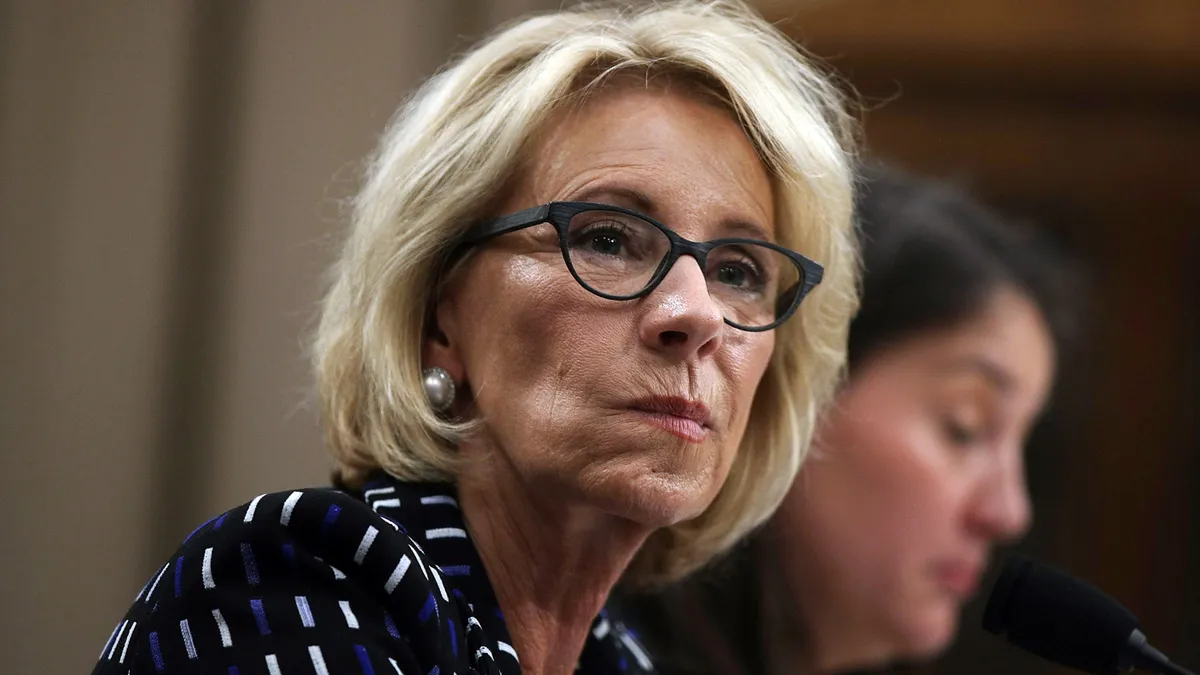Dive Brief:
- The U.S. Education Department on Thursday released a handbook outlining oversight rules for accreditors seeking recognition, updating the previous version issued in 2012.
- Critics say the handbook's release is premature, coming just a week after the department put its proposed new rules on accreditor oversight up for public comment.
- In a statement, Education Secretary Betsy DeVos said the new handbook provides "clearer, more concise requirements" for what and how much information accreditors should submit for compliance.
Dive Insight:
The handbook update comes as the department awaits comments on its 400-plus pages of proposed rules on college accreditation. In all, the rules ease oversight of accreditors while giving them a wider berth when deciding whether to take action on an institution. It also makes it easier for colleges to get programs approved.
The department says the handbook is based on current rules, but critics worry they conflate the department's rulemaking priorities, which are still out for comment.
For instance, the handbook adds the option for the department to conduct a site visit with an accreditor to "obtain a more complete understanding of the accreditors' processes and past actions," according to its statement.
However, the department indicated in the rulemaking process that it will only put evidence from this type of review in the public record if it finds noncompliance, said Antoinette Flores, associate director for higher education at the Center for American Progress, a left-leaning think tank.
Promoting site visits is a concern, she said, because "no one is going to be able to substantiate what, exactly, the department looked at and whether they did an adequate job of looking at evidence."
Another concern with how the handbook presents accreditors' requirements is whether an accreditor is in compliance if it has a standard but hasn't implemented it during the review period. That's something the new handbook says is allowed.
But existing regulations, Flores said, "mention effective application numerous times." She added, "the department should be looking for how they (accreditors) are implementing their standards, not whether they have a standard on paper."
Clare McCann, deputy director for federal higher ed policy at left-leaning think tank New America, raised issue with the handbook's limits on accreditors' use of self-reported data for determining a college's job-placement rates.
Most national accreditors consider job-placement rates because the institutions they cover tend to have a vocational focus, McCann said. Not having them could remove a key oversight mechanism to make sure these schools are fulfilling their obligations.
Self-reported survey data can be seen as unreliable. However, McCann noted, "in most cases, survey data are going to be the best they have."
Flores said it is unclear whether the department has the authority to issue this requirement through guidance.
With the rulemaking process underway, the department hopes the handbook will clarify what accreditors are responsible for in the meantime.
"Too much of the accreditation process has become about paperwork and not people," DeVos said in the statement. "As we seek public comment on our Accreditation Notice of Proposed Rulemaking, we have also taken a hard look at the way in which we implement our current regulations in order to improve the efficiency and effectiveness of the process."
Whether the department can process those comments and put forward final rules by its Nov. 1 deadline is uncertain. Last year it missed a similar deadline when rewriting rules for borrower defense and gainful employment.
The department is expected to issue two more rules on accreditation specific to online education and faith-based schools. It said it will update the handbook when new rules are finalized.















